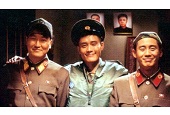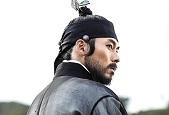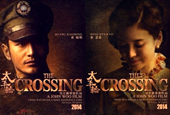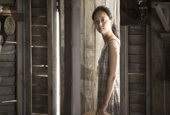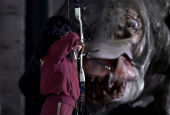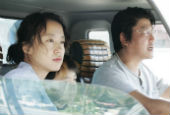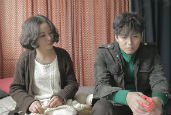Christmas in August (1998)
Directed by Hur Jin-ho

Comments by film critic Lee Yeon-ho
Critics mostly describe the film by Hur Jin-ho as "a melodrama provoking fresh emotion." Being categorized as a melodrama shows that the film is largely based on romance, but it does not explain the details and delicate nuances that underline the movie. A word that best describes the film is "movie-like," which might sound like a cliché. Making something that is "movie-like" sounds simple but it does not come so naturally. "Christmas in August" is that kind of movie, a movie-like film, debut work and melodrama. It is Hur's debut work (1998) and it is a melodrama and thus the "movie-like" rhetoric becomes more meaningful to me.
Of course, this is how I remember the film and there must have been some prejudices over melodramas at work in my mind. In most melodramas, there are many barriers here and there that interfere with the passionate love of the characters. The dialogue is too obvious, while incidents that take place in the story are overly dramatic. There are loads of corny sentiments while actors add to such. However, the dissonance created by melodramatic films generates criticism within the society that has caused it and lets viewers sympathize with characters in the films.
What is interesting is that if someone lists the general characteristics of melodramas, he would find how unconventionally "Christmas in August" is made for a melodrama. This is why the film is categorized as a melodrama from the beginning - it is not my classification. It is how the production company intended to make the film and how it was described when it was released and classified in Korean film history. This is also why movie-like films are placed at the opposite end of the spectrum to melodramas.
As the story progresses, "Christmas in August" moves from melodrama to movie-like film. There is some romance but there is no drama. There is certainly some emotional exchange between Jeong-won, who is dying, and Da-rim, but there is no special drama. It does not matter whether it is Jeong-won's last love or Da-rim's first love. Their love does not seem like destiny but more like an attachment that has built up in everyday life. Their attachment progresses little by little when they eat ice cream together and as they ride on the same scooter, sitting ever so close to each other.
There is emotion but there is no drama. This leaves strong lingering imagery but it also makes the film a little unexciting. However, such dullness and indifference that cannot be seen on TV dramas allows viewers to see something else in the movie. It is often the silhouette of a character from behind and it creates a deafening abyss like the light falling on a porch.
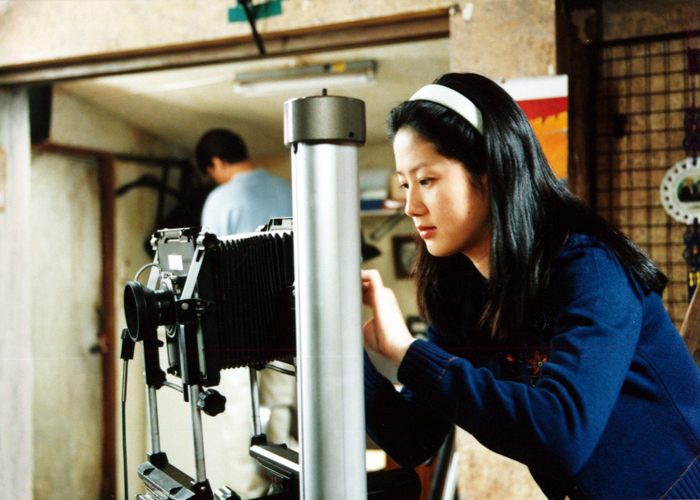
What is also lacking in "Christmas in August" is an effort to make everyday life overly stylish. When a film is filled with trivial episodes, a director or a screenwriter is tempted to use certain techniques or classical approaches to make the film seem complete. That kind of effort often appears as a repetition of daily life and slows down the development of a story or makes the story seem written in a circle. However, director Hur seemed to understand this fine line very well and did not overdo or under-do to avoid falling into that trap.
Let's take the example of using a photograph of a woman on the wall of the photo studio. There are scenes in which Ji-won, Jeong-won's first love, shows up at his doorstep. Jeong-won, who is cleaning his studio, is seen through the window with water flowing down on it. In the next scene, Jeong-won takes a bus to hospital and Sanullim's, "An old memory dimly comes up in my mind over the window," is played on the radio. Then, through Jeong-won's monologue, viewers realize that Ji-won wanted to have her photograph removed. Jeong-won says love will only end up being a memory someday. However, Da-rim's photograph hanging in the studio later leads to something different. One day, Da-rim, who is not yet aware of Jeong-won's death, throws a stone toward the studio to express her resentment. Then, she sees her own photograph hanging on the wall of the studio. Next, a smile spreads out over Da-rim's face and this shows her confidence over Jeong-won's love. Viewers may be very saddened to see Da-rim's smile since they already know about Jeong-won's death, but the director ends the movie here. In the film, Jeong-won's daily life is shown, as images of the photographer taking pictures of his girlfriend appear and disappear, creating strong pathos.
Most of all, the film has no dramatic incident of death and this is what differentiates it from other melodramas. As the story of a terminally ill patient's love and life goes, there may well be sentimentalism and exaggeration at times of critical emotion. However, there is no dramatic description of death or emotion. This is because in the film, the photographer is the only one who knows about his fate and he alone deals with the pain of dying. Jeong-won occasionally drinks with his friends and sobs alone, covering himself with a blanket. However, he worries more about the pain his family will suffer after his death, than his own situation.
Jeong-won's rather quiet death leads viewers to calmly gaze after the people, scenery and objects surrounding him. The delicate scenes created by the late director of photography, You Young-gill, for whom the film became a last work, describe waves of changing emotion throughout Jeong-won's time and space. Jeong-won prepares a detailed manual on how to use the video cassette player for his elderly father, and this scene, as well as the objects he touches leave a strong impression. In the end, whether it is a movie-like film or not may be determined by a lingering recollection that remains long after someone has watched the film and has nearly lost all memory of it. When recollecting "Christmas in August," an image of a man who sits on a porch in a slouched position and clips his toenails comes up to my mind. That man's death approaches minute by minute and yet he is as quiet as his growing toenails. But, he is too young.
- Viewed by film critic film critic Lee Yeon-ho
*This series of articles has been made possible through the cooperation of the Korean Film Archive.
*Click here to see previous parts of our series of Korea.net's must-see films.

Directed by Hur Jin-ho
Jeong-won, played by Han Suk-kyu, is a photographer in his 30s who works out of his own studio on the outskirts of Seoul. He is terminally ill, and accepts his fate. His life goes on as usual.
He encounters a number of customers: A student from his high school days wants to enlarge a photograph of a girl he might be falling in love with. A middle-aged woman seeks restoration of old photographs taken during her youth. Another woman in her last years visits the studio alone to take a portrait in preparation for her funeral. Living a monotonous life, Jeong-won quietly prepares for his own death. He creates a manual so that his father, played by Shin Goo, is able to operate the video player on his own.
One day, he happens to meet Da-rim, played by Shim Eun-ha. She is a parking inspector, and is always bright and cheerful. After this encounter with Da-rim, Jeong-won becomes restless for some reason. Da-rim visits the studio at a similar time every day to have the photographs of illegally parked cars developed. She sometimes asks him to install the roll of film in her camera. And sometimes she complains about what happened during her day. Everything she does looks beautiful to Jeong-won.
Jeong-won gets taken to hospital. Da-rim knows nothing about this and visits the studio as usual. The studio is closed, for a long time. After Jeong-won passes away, Da-rim passes by the studio. She finds her own portrait hanging in the window. Looking at her portrait, she smiles.

Comments by film critic Lee Yeon-ho
Critics mostly describe the film by Hur Jin-ho as "a melodrama provoking fresh emotion." Being categorized as a melodrama shows that the film is largely based on romance, but it does not explain the details and delicate nuances that underline the movie. A word that best describes the film is "movie-like," which might sound like a cliché. Making something that is "movie-like" sounds simple but it does not come so naturally. "Christmas in August" is that kind of movie, a movie-like film, debut work and melodrama. It is Hur's debut work (1998) and it is a melodrama and thus the "movie-like" rhetoric becomes more meaningful to me.
Of course, this is how I remember the film and there must have been some prejudices over melodramas at work in my mind. In most melodramas, there are many barriers here and there that interfere with the passionate love of the characters. The dialogue is too obvious, while incidents that take place in the story are overly dramatic. There are loads of corny sentiments while actors add to such. However, the dissonance created by melodramatic films generates criticism within the society that has caused it and lets viewers sympathize with characters in the films.
What is interesting is that if someone lists the general characteristics of melodramas, he would find how unconventionally "Christmas in August" is made for a melodrama. This is why the film is categorized as a melodrama from the beginning - it is not my classification. It is how the production company intended to make the film and how it was described when it was released and classified in Korean film history. This is also why movie-like films are placed at the opposite end of the spectrum to melodramas.
As the story progresses, "Christmas in August" moves from melodrama to movie-like film. There is some romance but there is no drama. There is certainly some emotional exchange between Jeong-won, who is dying, and Da-rim, but there is no special drama. It does not matter whether it is Jeong-won's last love or Da-rim's first love. Their love does not seem like destiny but more like an attachment that has built up in everyday life. Their attachment progresses little by little when they eat ice cream together and as they ride on the same scooter, sitting ever so close to each other.
There is emotion but there is no drama. This leaves strong lingering imagery but it also makes the film a little unexciting. However, such dullness and indifference that cannot be seen on TV dramas allows viewers to see something else in the movie. It is often the silhouette of a character from behind and it creates a deafening abyss like the light falling on a porch.

What is also lacking in "Christmas in August" is an effort to make everyday life overly stylish. When a film is filled with trivial episodes, a director or a screenwriter is tempted to use certain techniques or classical approaches to make the film seem complete. That kind of effort often appears as a repetition of daily life and slows down the development of a story or makes the story seem written in a circle. However, director Hur seemed to understand this fine line very well and did not overdo or under-do to avoid falling into that trap.
Let's take the example of using a photograph of a woman on the wall of the photo studio. There are scenes in which Ji-won, Jeong-won's first love, shows up at his doorstep. Jeong-won, who is cleaning his studio, is seen through the window with water flowing down on it. In the next scene, Jeong-won takes a bus to hospital and Sanullim's, "An old memory dimly comes up in my mind over the window," is played on the radio. Then, through Jeong-won's monologue, viewers realize that Ji-won wanted to have her photograph removed. Jeong-won says love will only end up being a memory someday. However, Da-rim's photograph hanging in the studio later leads to something different. One day, Da-rim, who is not yet aware of Jeong-won's death, throws a stone toward the studio to express her resentment. Then, she sees her own photograph hanging on the wall of the studio. Next, a smile spreads out over Da-rim's face and this shows her confidence over Jeong-won's love. Viewers may be very saddened to see Da-rim's smile since they already know about Jeong-won's death, but the director ends the movie here. In the film, Jeong-won's daily life is shown, as images of the photographer taking pictures of his girlfriend appear and disappear, creating strong pathos.
Most of all, the film has no dramatic incident of death and this is what differentiates it from other melodramas. As the story of a terminally ill patient's love and life goes, there may well be sentimentalism and exaggeration at times of critical emotion. However, there is no dramatic description of death or emotion. This is because in the film, the photographer is the only one who knows about his fate and he alone deals with the pain of dying. Jeong-won occasionally drinks with his friends and sobs alone, covering himself with a blanket. However, he worries more about the pain his family will suffer after his death, than his own situation.
Jeong-won's rather quiet death leads viewers to calmly gaze after the people, scenery and objects surrounding him. The delicate scenes created by the late director of photography, You Young-gill, for whom the film became a last work, describe waves of changing emotion throughout Jeong-won's time and space. Jeong-won prepares a detailed manual on how to use the video cassette player for his elderly father, and this scene, as well as the objects he touches leave a strong impression. In the end, whether it is a movie-like film or not may be determined by a lingering recollection that remains long after someone has watched the film and has nearly lost all memory of it. When recollecting "Christmas in August," an image of a man who sits on a porch in a slouched position and clips his toenails comes up to my mind. That man's death approaches minute by minute and yet he is as quiet as his growing toenails. But, he is too young.
- Viewed by film critic film critic Lee Yeon-ho
*This series of articles has been made possible through the cooperation of the Korean Film Archive.
*Click here to see previous parts of our series of Korea.net's must-see films.
